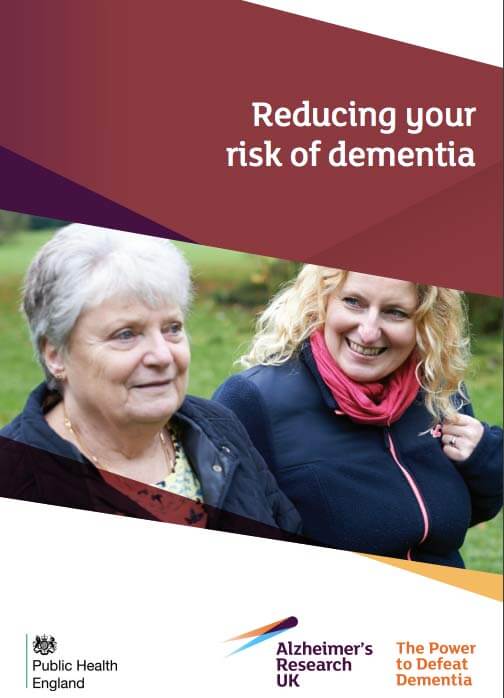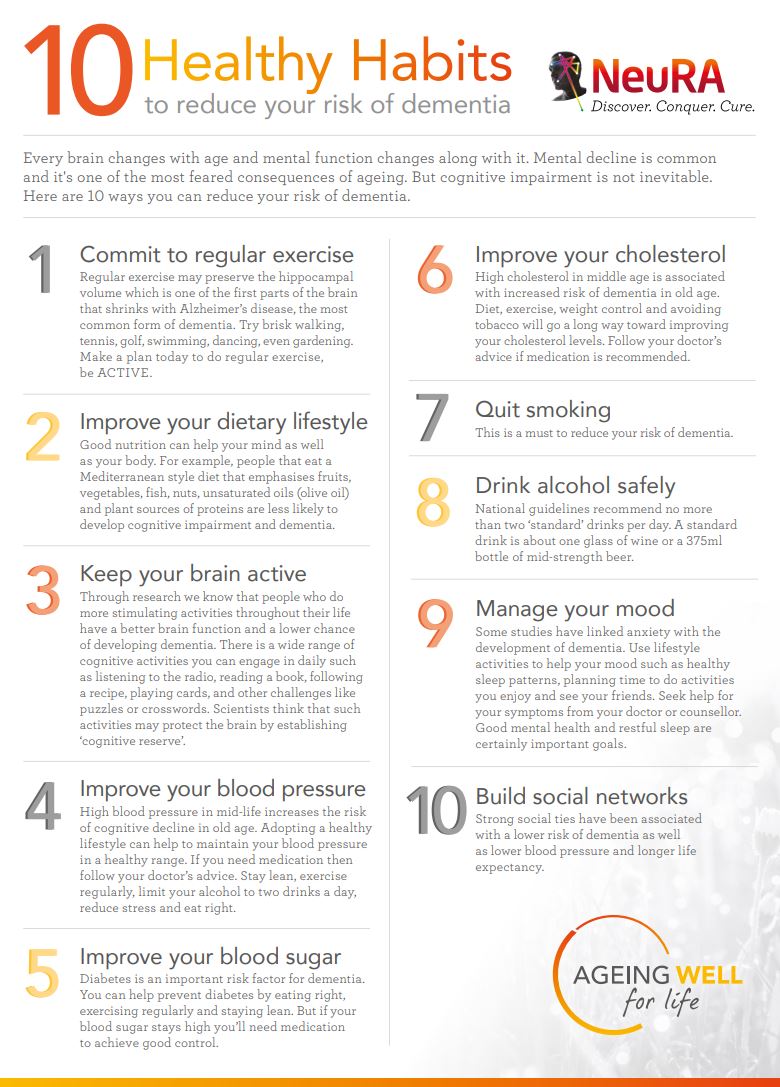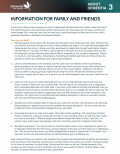Low or no data? Visit zero.govt.nz, scroll down the page then click on our logo to return to our site and browse for free.
Reducing your risk of dementia
Key points about reducing your risk of dementia
- Some dementia risk factors are difficult or impossible to change, such as ageing and genes.
- But there are lifestyle factors that affect risk and by changing these you could reduce your risk of dementia by up to 30%.
- The 5 key things to do are to look after your heart, be physically active, follow a healthy diet, challenge your brain and enjoy social activity.

- Dementia is a general term used to describe a decline in mental functioning to the point that it impairs your ability to carry out daily tasks.
- The most common type of dementia is Alzheimer's disease. Other forms include vascular dementia, Lewy Body dementia, and those associated with degenerative neurological conditions such as Parkinson’s disease, Creutzfeld-Jakob disease and Huntington’s Chorea.
- While dementia is most often diagnosed later in life, your brain usually starts to develop changes years earlier.
- Some dementia risk factors are difficult or impossible to change, such as aging and genes. But there are lifestyle factors that affect risk and by changing these you could reduce your risk of dementia by up to 30%.
- The 5 key things to do are to look after your heart, be physically active, follow a healthy diet, challenge your brain and enjoy social activity.
The diseases that lead to dementia are complex, and there is still a lot to learn about the risk factors – the things that increase your chances of developing a condition. In most cases, it's likely that your age, genes, medical history and lifestyle all contribute to your risk of developing dementia.
Some risk factors are difficult or impossible to change. These include:
- Age – the older you are, the more likely you are to develop dementia. But dementia doesn’t have to be a normal part of aging.
- Genes – although genetic factors affect some more unusual forms of dementia, such as early-onset Alzheimer’s disease and frontotemporal dementia, it mostly develops as a combination of genetic and lifestyle factors.
Other factors may also be important, such as:
- hearing loss
- untreated depression
- loneliness or social isolation
- a sedentary lifestyle.
Generally, what is good for your heart is also good for your brain.
Risk factors for cardiovascular disease (like heart disease and stroke) are also risk factors for dementia. Adopting a healthy lifestyle, including regular exercise, helps lower your risk of cardiovascular diseases and is likely to lower your risk of dementia too, particularly vascular dementia (brain damage from impaired blood flow to your brain).
Quit smoking
There is evidence that smoking can increase your risk of dementia, particularly Alzheimer’s disease. Smoking causes your arteries to narrow, which can raise your blood pressure. It also increases your risk of cardiovascular disease, as well as several cancers. Read about quitting smoking.
Limit alcohol consumption
Studies into whether alcohol consumption is linked to dementia risk have had mixed results and research is ongoing. However, very heavy drinking is known to cause alcohol-related dementia, called Wernicke-Korsakoff Syndrome.
Drinking excessive amounts of alcohol(external link)(external link) increases your risk of stroke, heart disease and some cancers, as well as damaging your nervous system, including your brain.
It's a good idea, therefore, to limit your drinking to no more than 2 standard drinks on each drinking occasion. Learn more about managing alcohol intake.
Be physically active every day
A lack of regular physical activity can increase your risk of heart disease, becoming overweight or obese, and type 2 diabetes – all of which are risk factors for dementia.
Older adults who don't exercise are also more likely to have problems with memory or thinking (known as cognitive abilities). Research suggests that exercise can help to reduce the risk of cognitive impairment and dementia.
Any kind of physical activity helps – find something that you enjoy and do it every day.
Eat a healthy diet
A diet low in saturated fat, salt and sugar, and high in fibre can reduce your risk of high blood pressure(external link)(external link), high cholesterol(external link)(external link), becoming overweight or obese and type 2 diabetes.
Having some fat in your diet is important, particularly unsaturated fat found in oily fish, nuts, seeds and avocados. Oily fish, like salmon and sardines, contains omega-3 fatty acids. While omega-3 fatty acids are an important part of your diet, current evidence does not support the use of omega-3 or other food supplements to prevent a decline in memory and thinking skills. However, research in this area is ongoing.
There is, however, good evidence that eating a Mediterranean-style diet can reduce your risk of developing some forms of dementia. A Mediterranean diet includes lots of vegetables and fruits, wholegrains, legumes and beans, fish and olive oil, with less red meat and processed food. Read more about healthy eating.
Manage your blood pressure
Research shows that high blood pressure in mid-life is a key factor that can increase your risk of developing dementia in later life, particularly vascular dementia. Having high blood pressure puts strain on your blood vessels, which can raise also your chances of kidney damage, stroke, heart attack and heart disease.
You can prevent high blood pressure by not smoking, being active, maintaining a healthy body weight, eating a healthy diet and limiting your salt intake. Find out more about preventing high blood pressure.
Have a healthy body weight
Being overweight or obese can increase your blood pressure and risk of type 2 diabetes, both of which are linked to a higher risk of Alzheimer's disease and vascular dementia.
Body mass index (BMI) is a measurement that can be used to estimate if you are in the healthy weight range. Use this BMI calculator to check whether your weight is the healthy range here and find out how to lose weight if you need to.
Stretch your mind
By challenging your brain with new activities you can help build new brain cells and strengthen the connections between them. This helps to increase your ‘cognitive reserve’. This may counter the harmful effects of Alzheimer’s disease and other forms of dementia. Try one of the following to give your mind a workout:
- reading
- doing crosswords, Sudoku and other puzzles
- playing bridge, mahjong or chess
- learning te reo Māori or another new language
- learning how to play a musical instrument like the ukelele
- learning a handcraft, such as knitting or cross-stitch
- taking a course in something you’ve always been interested in.
Be social
Engaging with other people may help to reduce your risk of developing dementia because it stimulates your brain, and it may also help to reduce the risk of developing depression.
Manage depression
Depression may be also associated with a higher risk of developing dementia. Evidence is emerging about the physical effects of depression on your brain. Learn more about managing depression.
Get good sleep
Studies have found that poor sleep is a risk factor for cognitive decline and Alzheimer’s disease. If you have difficulties sleeping, try these tips to improve your sleep habits.
Look after your hearing
Research from The University of Auckland has shown that those with midlife hearing loss are at a 9% higher risk of developing dementia. Always protect your ears from loud noise. If you are straining to hear, get your hearing tested and wear hearing aids if you need them. Also, get any ear conditions treated when they occur. Read about hearing loss in adults and ear care and conditions.
Take care of your head
A serious head injury, with loss of consciousness, is associated with a higher risk of developing dementia. Learn more about head injuries.
Video: The Preventing Dementia MOOC - University of Tasmania's free online course
This video may take a few moments to load.
(Wicking Dementia, AU, 2017)
The following links provide further information about reducing your risk of dementia. Be aware that websites from other countries may have information that differs from New Zealand recommendations.
Can dementia be prevented?(external link) NHS, UK, 2020
Dementia(external link) Patient Info, UK
How to reduce your risks of dementia(external link) The Conversation, Jan 2019
Lifestyle changes can help reduce the risk of dementia(external link) Alzheimer's.net, 2018
Just dance – how certain types of movement boost your brain(external link) Being Patient, 2019
Even low-level activity may help reduce dementia risk(external link) Medical News Today, 2019
Adopting a healthy lifestyle helps reduce the risk of dementia(external link) World Health Organization, 2019
Resources
Reducing your risk of dementia(external link) Alzheimer's Research UK, 2021
10 healthy habits to reduce your risk of dementia(external link) NeuRA, Australia
Getting a diagnosis of dementia(external link) Dementia New Zealand, 2022
Information for family and friends(external link) Dementia New Zealand, 2023
Positive communication(external link) Dementia New Zealand, 2022
Dementia and behaviours(external link) Dementia New Zealand, 2022
References
- Can dementia be prevented?(external link) NHS Choices, UK, 2017
- Reduce the risk of developing Alzheimers(external link) Alzheimer's NZ
- Ahlskog JE, Geda YE, Graff-Radford NR, Petersen RC. Physical exercise as a preventive or disease-modifying treatment of dementia and brain aging(external link) Mayo Clin Proc. 2011 Sep; 86(9): 876–884.
- There may finally be something you can do to lower your risk of dementia(external link) Time Health, US, 2018
- Spira AP, Chen-Edinboro LP, Wu MN, and Yaffe K. Impact of sleep on the risk of cognitive decline and dementia(external link) Curr Opin Psychiatry. 2014 Nov; 27(6): 478–483.
- Reducing your risk of dementia(external link) Alzheimer's Research UK
Research on reducing dementia risk
Research findings increasingly point to the ability to reduce risk in developing dementia.
- Ahlskog JE, Geda YE, Graff-Radford NR, Petersen RC. Physical exercise as a preventive or disease-modifying treatment of dementia and brain aging(external link) Mayo Clin Proc. 2011 Sep; 86(9): 876–884.
- Spira AP, Chen-Edinboro LP, Wu MN, and Yaffe K. Impact of sleep on the risk of cognitive decline and dementia(external link) Curr Opin Psychiatry. 2014 Nov; 27(6): 478–483.
- Abell JG, Kivimäki M, Dugravot A. Association between systolic blood pressure and dementia in the Whitehall II cohort study – role of age, duration, and threshold used to define hypertension(external link) European Heart Journal. 2018, Sept 1;39(33):3119–3125.(external link)
- Blood pressure control reduces dementia risk in mid-life patients with AF(external link) European Society of Cardiology, 2019 (external link)
- How the evidence stacks up for preventing Alzheimer’s disease(external link) Nature International Journal of Science, 2018(external link)
- Preventing Alzheimer’s disease – what do we know?(external link) NIH National Institute on Aging, US, 2018(external link)
- Keeping active in middle age may be tied to lower risk of dementia(external link) Science Daily, 2019(external link)
- Even low-level activity may help reduce dementia risk(external link) Medical News Today, 2019
See our page Dementia for healthcare providers
Ongoing professional development
The Wicking Dementia Research and Education Centre at the University of Tasmania run two free Massive Open Online Courses (MOOCS). You can complete them at your own pace and you get a Certificate of Completion when you’re finished.
Understanding dementia(external link)
Preventing dementia(external link)
Brochures

Alzheimer's Research UK, 2021

NeuRA, Australia

Dementia New Zealand, 2023
Credits: Healthify editorial team. Healthify is brought to you by Health Navigator Charitable Trust.
Reviewed by: Dr Jenny Pevreal, clinical psychologist
Last reviewed:
Page last updated:





